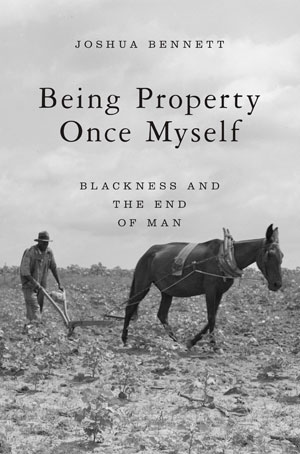
Being Property Once Myself is centrally concerned with how black authors have described their relationship to nonhuman forms of life, and to nonhuman animal life-worlds in particular, as a means of articulating the lived experience of blackness. The book is divided into five chapters, each of which homes in on the canonical works of a twentieth or twenty-first century black writer: Richard Wright, Toni Morrison, Zora Neale Hurston, Jesmyn Ward, and Robert Hayden, among others. Each of these sections also focuses on a distinct animal figure: the rat, the cock, the mule, the dog, and the shark, respectively, are all featured. The book offers more than a historical account of the ways that animalization has been deployed as a discrete feature of anti-black racism. Though it is certainly my sense that work committed primarily to this aim is useful, timely, and worth undertaking, Being Property Once Myself is an account of black feeling in the afterlife of slavery. It is my attempt to bear witness to what various forms of forced proximity between black people and nonhuman animals has produced at the level of literary imagination, and ethical inquiry.
What distinct ways of thinking about black life, black death, black gathering, refusal, and recalcitrance, have been forged in a context where black people are made to live in what I call a kind of caesura: a zone betwixt Man and animal, made necessary, mandatory, in order for those categories to maintain their integrity? How have black authors imagined a vision of human life that is not predicated upon the dominion or destruction of nonhuman life-worlds, but rather one that operates with the understanding that the very world the black expressive tradition strains against, i.e., the anti-black world masquerading as the earth in toto, is one that has likewise marked them as sociolegal nonpersons possessing no interior life, no spirit, nothing worthy of study or attention, cherishment or care?
With this frame in mind, it is my hope that we can rethink the task of black literary studies as a collective endeavoring toward a renewed vision of a beloved community. One which necessarily accounts for the flourishment of nonhuman life, and the varied forms of interspecies collaboration and conviviality which are an integral part of our intellectual inheritance. Blackness is the stewardship of the Earth. I hope readers approach the text with this sense of scale in mind, and with an eye toward abolitionist theory and practice. To think with the animals and the plants and the dark soil beneath us is to honor the spirit of our field, and to pursue the heart of its truest aims. Nothing less than the end of the world. Nothing less than the abolition of a symbolic order sustained by cages and chains.
My book elaborates upon the ongoing, centuries-long reality of anti-blackness as a structure of feeling; the recent ecological turn in black studies as an inter-institutional, intracommunal response to the fact of white supremacy as an environmental catastrophe; and the indomitable truth of black freedom struggle in the face of unthinkable devastation. It is a book about how we love each other. It is a book about the astonishing breadth of the each other at the end of that last sentence. And thus, the depth of our love. It asserts that our dead are always with us. In that sense and others, it is also a book for my grandmother, Charlotte, who passed at the outset of the COVID-19 pandemic, and her mother before her. The same woman who prayed for her grandchildren’s children in a South Bronx tenement, speaking words over the life of a boy she would never meet in the flesh. I live and breathe in the wake of her words flung to heaven. When I sit down to write, I aspire toward the power of her conviction and her meditative tenacity.
The professional path that led me to the book was being raised by black people that loved black people, and who taught me from a young age to believe that our stories were worth telling. Our tradition worth studying. Our people worth language lovely enough to approach, if only at a distance, the transcendent joy that is made possible when we are gathered together. I was trained as an undergraduate in an Africana Studies program at the University of Pennsylvania. As an eighteen-year old, I understood the program—now a department—as first and foremost a haven for black students trying to make it through the institution with varying levels of success. This, of course, was a pivotal moment in my development as a writer and thinker. The habits of study we learned were inextricable from a commitment to taking care of the most vulnerable among us. We were taught the mission and methods of black studies so that we might better understand the truth of the world and how we might improve it, no matter our professional trajectories or individual dreams. My time as a graduate student at Princeton, and as a Junior Fellow in the Society of Fellows at Harvard after that, only concretized my sense that the power of black studies was in its capacity to enhance our social and political imaginations in this way. I learned who I was in the order of things, and my sense of what was possible only grew from there. Additionally, through the generous mentorship of Saidiya Hartman, Gregory Pardlo, Imani Perry, Josef Sorett and others, I came to understand myself as someone who did not have to relinquish my sensibilities as a poet to become a literary scholar, but could instead embrace the language, the liveness, of black poetry to enhance my approach to the lifelong work of literary theory.
I would hope that “just browsing” readers in a bookstore would encounter the introductory section, “Horse,” or the penultimate chapter, “Dog” first. “Horse” for the simple fact that I try therein to not only lay out the arguments for the book itself, but to make a certain set of claims about ecological criticism broadly construed—and the work of giants like Lucille Clifton and Sylvia Wynter in particular—that I hope will eventually reach a much wider audience of people even outside of those who might feel inclined to pick up the book. What I’m also trying to offer in that introductory passage is an explicitly eco-critical approach to reading the oeuvre of Frederick Douglass; one that is becoming a more and more important part of my larger research project, even beyond Being Property Once Myself.
The “Dog” chapter comes to mind for similar reasons. Therein, I’m offering a reading of Jesmyn Ward’s fantastic sophomore novel, Salvage The Bones, that gets us a bit further, I think, than the traditional concerns of something like animal studies—though I’m clear in the beginning of the book that my contribution is more of a piece with what Michael Lundblad has elsewhere termed animality studies—and closer to the core of my concern throughout the text. That is, the way that a certain lived proximity to animals opens up room for the writers I am interested in to make all sorts of compelling claims about black social life, especially within the context of environmental (and otherwise) catastrophe.
In the Ward chapter, this takes the form of a close reading of a scene in the book which transpires directly after Hurricane Katrina hits the fictional town of Bois Sauvage, Mississippi. But this concern is also present in the third chapter’s reading of the hurricane that hits “The Muck” in Their Eyes Were Watching God. In these moments where the world—i.e., the province of human dominion, the ostensibly owned earth—falls apart, what modes of black assembly come to the fore? And how might this thematic echo help us think differently about the relationship between black freedom struggle and ecological criticism, black poetics and the black earth, abolition and interspecies collaboration? Many of my favorite lines from the book are also in these sections, so there is admittedly, for me, a craft element at play here as well. As I sit here now, thinking at the dining room table about this question, it’s clear. The moments of composition where I felt most free, most in tune with the music that makes a project like this possible, took place while writing those sections.
My hope for the book is that it lives a long life, and that it is ultimately considered a meaningful contribution to the growing constellation of texts examining both the history and present workings of black critical theory concerned with nonhuman life-worlds. I also hope—and I have said this elsewhere—that the book’s engagement with the work of black poets is a reminder that poetry plays an absolutely central role within both black letters and black social life. Here I’m thinking, of course, of Jupiter Hammon and Phillis Wheatley as some of our earliest literary ancestors in terms of the written page. But I’m also thinking about the role—as Hortense Spillers so beautifully details in her stunning 1974 dissertation, Fabrics of History: Essays on the Black Sermon—of black preaching as the first form of black poetry in the U.S. context. The tone and texture of this book (and all my writing, really) was influenced in the first instance by black preaching. Given those conditions of emergence, I hope, whatever its merits are, that my book shines a light on the aesthetic brilliance of black writing, black performance, and black poetics, as they operate outside the borders of the U.S. American academy.
I hope as well that the book contributes to a renewed interest in the writings of all the authors whose work I have explored within its pages. The discovery of this particular thread in their works has changed my life in so many distinct, divergent ways—my intellectual, aesthetic, political, and spiritual sensibilities have never been the same—and so it is one of my dreams for the book that it likewise inspires others to think about the work of environmental reparation and black freedom struggle as fundamentally intertwined.
Finally, I hope that the book serves as a useful entrée into the contemporary workings of black literary studies as such for anyone who might be unfamiliar with the field. Our work, I believe, is one that comes with a singular responsibility. It was Carter G. Woodson who once wrote that there would “be no lynching if it did not start in the schoolroom.” Our collective project, then, is not only the repudiation of lies about the role of our people in history, but the forwarding of new images, new language, a more robust and truthful engagement with the indomitable beauty of the black expressive tradition, and all that it has given us.


Joshua Bennett is the Mellon Assistant Professor of English and Creative Writing at Dartmouth. He is the author of three books of poetry and criticism: The Sobbing School (Penguin, 2016)—winner of the National Poetry Series and a finalist for an NAACP Image Award—Being Property Once Myself (Harvard University Press, 2020), and Owed (Penguin, 2020). Bennett has received fellowships from the National Endowment for the Arts, the Ford Foundation, MIT, and the Society of Fellows at Harvard University. His first work of narrative nonfiction, Spoken Word: A Cultural History, is forthcoming from Knopf.